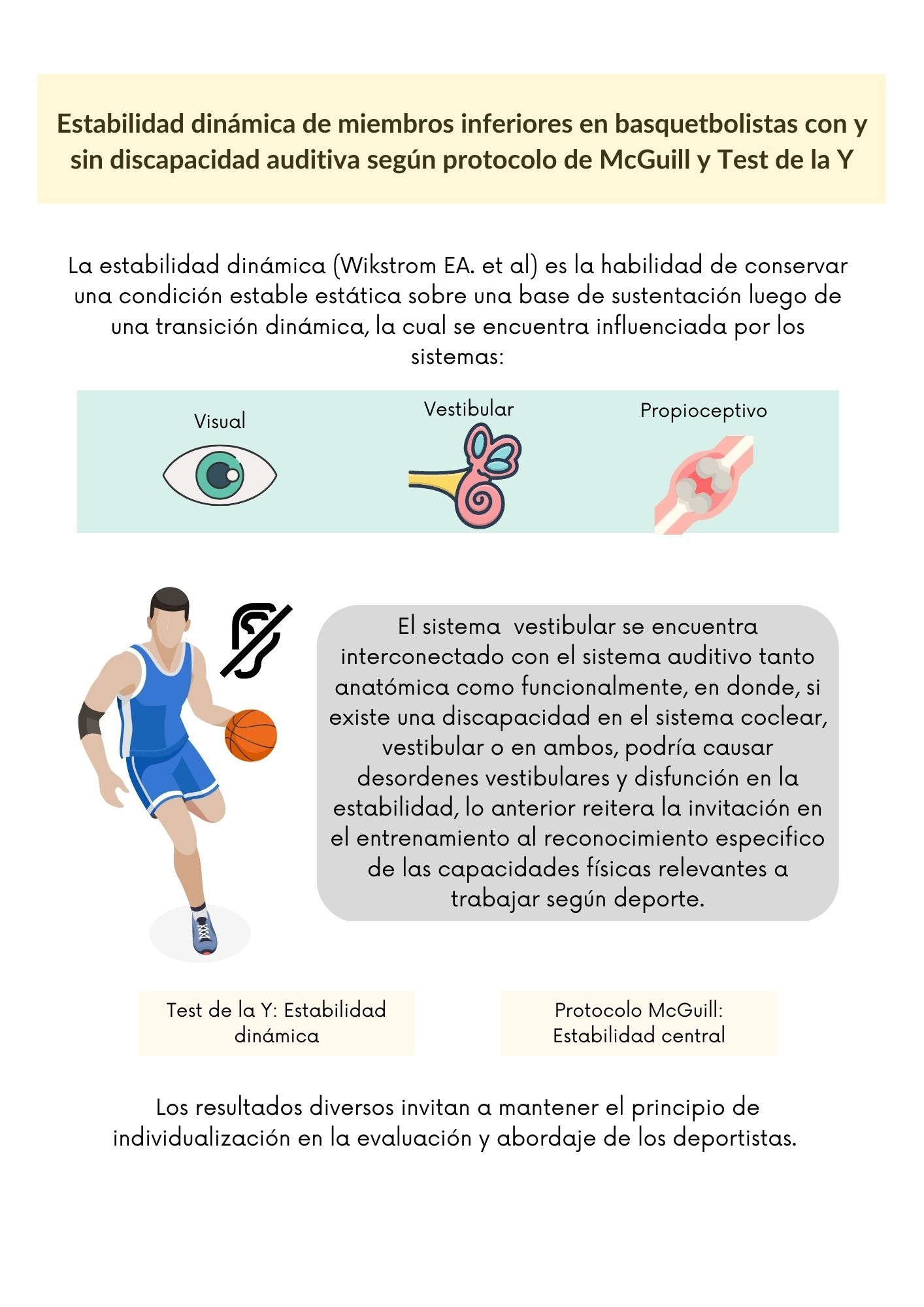Dynamic stability of lower limbs in basketball players with and without disabilities according to the McGuill protocol and the Y balance test
Dynamic stability of lower limbs in basketball players
DOI:
https://doi.org/10.18633/biotecnia.v25i2.1925Keywords:
Basketball, Hearing impairment, Dynamic stability, Basketball players without hearing impairmentAbstract
Introduction: Dynamic stability is the ability to preserve a static stable condition on a sustaining base after a dynamic transition, therefore, it is relevant in basketball due to changes in direction, acceleration and deceleration, a fact that affects both hearing impaired and non-hearing impaired athletes. Aim: To identify characteristics related to dynamic
stability of lower limbs in basketball players with and without hearing impairment. Methods: Descriptive study in athletes with and without hearing impairment between 18 and 45 years of age from Valle del Cauca. Sociodemographic, clinical
and anthropometric variables, history, dynamic stability with the Y test, and core strength with the McGuill protocol were evaluated. Results: No significant differences were found in the dynamic stability variable in athletes with nor without hearing impairment, however, 2 athletes, with and without hearing impairment obtained a composite above
the average. For the core muscle resistance variable, longer times were obtained in the left lateral decubitus test than in the right lateral decubitus test, this being their dominant side. Conclusion: The diverse results invite us to maintain the principle of individualization in the evaluation and approach
to athletes.
Downloads
References
Kızar, O., Demir, G. T., y Genç, H. 2021. EXAMINATION OF THE EFFECT OF NATIONAL AND AMATEUR DISABLED ATHLETES’DISABILTY TYPES ON SPORTS PARTICIPATION MOTIVATION. European Journal of Physical Education and Sport Science. 6(12).
Uchida, T., Miyazaki, T., Azuma, M., Umeda, S., Kato, N., Sumiyoshi, H. y Hiruma, N. 2017. Sign language support system for viewing sports programs. In Proceedings of the 19th International ACM SIGACCESS Conference on Computers and Accessibility. 339-340.
Bernal-Reyes, F., Peralta-Mendívil, A., Gavotto-Nogales, H. H., y Placencia-Camacho, L. 2014. Principios de entrenamiento deportivo para la mejora de las capacidades físicas. Biotecnia. 16(3): 42-49.
Wikstrom, E. A., Tillman, M. D., Smith, A. N., y Borsa, P. A. 2005. A new force-plate technology measure of dynamic postural stability: the dynamic postural stability index. Journal of athletic training. 40(4): 305.
Szymczyk, D., Drużbicki, M., Dudek, J., Szczepanik, M., y Snela, S. 2012. Balance and postural stability in football players with hearing impairment. Balance. 3: 258-263.
Sasaki, S., Tsuda, E., Yamamoto, Y., Maeda, S., Kimura, Y., Fujita, Y., y Ishibashi, Y. 2019. Core-muscle training and neuromuscular control of the lower limb and trunk. Journal of athletic training. 54(9): 959-969.
Huxel Bliven, K. C., & Anderson, B. E. 2013. Core stability training for injury prevention. Sports health. 5(6):514-522.
Akınoğlu, B., y Kocahan, T. 2018. Comparison of muscular strength and balance in athletes with visual impairment and hearing impairment. Journal of exercise rehabilitation. 14(5): 765.
Hartley, E. M., Hoch, M. C., y Boling, M. C. 2018. Y-balance test performance and BMI are associated with ankle sprain injury in collegiate male athletes. Journal of science and medicine in sport. 21(7): 676-680.
Plisky, P. J., Rauh, M. J., Kaminski, T. W., y Underwood, F. B. 2006. Star Excursion Balance Test as a predictor of lower extremity injury in high school basketball players. Journal of orthopaedic & sports physical therapy. 36(12): 911-919.
Peña, G., Heredia Elvar, J. R., Moral, S., Isidro Donate, F., y Mata Ordoñez, F. 2012. Revisión de los métodos de valoración de la estabilidad central (CORE). PubliCE Standard.
Suarez, H., Angeli, S., Suarez, A., Rosales, B., Carrera, X., y Alonso, R. 2007. Balance sensory organization in children with profound hearing loss and cochlear implants. International journal of pediatric otorhinolaryngology. 71(4): 629-637.

Downloads
Additional Files
Published
How to Cite
Issue
Section
License
Copyright (c) 2023

This work is licensed under a Creative Commons Attribution-NonCommercial-ShareAlike 4.0 International License.
The journal Biotecnia is licensed under the Attribution-NonCommercial-ShareAlike 4.0 International (CC BY-NC-SA 4.0) license.
















_(2).jpg)







